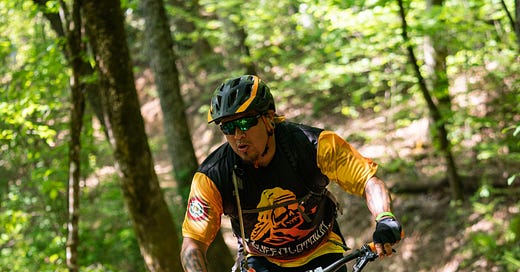Fire Mountain Trail system builds mountain biking community among Eastern Band of Cherokee Indians, draws mountain bikers from across Western North Carolina
The trails are helping WNC residents interact more with the tribe, one official says

Editor’s note: The Ashevegas Hot Sheet will occasionally feature the work of guest writers/reporters. Have an idea for a story? Email: sandford.jason@gmail.com.
By Jack Igelman
Jeremy Hyatt, operations secretary for the Eastern Band of Cherokee Indians, spends most of his day managing 17 divisions on the nation’s Qualla Boundary, everything from fire and rescue to road building projects.
But on Thursday afternoon, you’ll likely find him on the group mountain bike ride on Fire Mountain, a multi-use trail system that opened in Cherokee in 2017. It’s the setting of a burgeoning community of indigenous riders.
“Seeing my neighbors and friends pick up mountain biking is really exciting,” he said. “It’s incredible seeing people focusing on health, community building, and enjoying the freedom of riding a bicycle through the woods.”
The Fire Mountain Trail system is the brainchild of Tinker Jenks, a former planner in the EBCI’s economic and community development office. She wanted to bring an alternative recreational activity to the tribe. A tribal resolution in 2014 authorized the planning and development of the grant-funded, 10.5-mile trail system that was completed by contractor Trail Dynamics in 2017.
Fire Mountain includes three sections of trails divided by difficulty, from beginner rides to expert.
When the project landed on Hyatt’s desk several years ago, he enthusiastically ushered it ahead. As he sees it, getting folks on bikes is just one benefit. To his surprise, an unexpected perk of the trails is the buzz among riders throughout the region.
“It’s turned into a regional attraction. It’s become far more popular than I anticipated,” said Hyatt. “The trails are, in a small way, helping the region interact more with the EBCI and us with Western North Carolina.”
Growing up in Bryson City, Hyatt rode with his dad, who was a cycling enthusiast. He started grinding out rides with him, at first, on a clunky BMX bike.
“My dad was an anomaly. You just don’t see a ton of people [from the EBCI] hopping on cycles,” he said. Hyatt eventually acquired his first mountain bike at age 15. He remains an avid rider.
Despite Hyatt’s ease of access into the sport by way of a family member, the lack of minority participation in mountain biking and other outdoor recreational activities is universal in the U.S. According to a 2020 report from the Outdoor Recreation Association, 71.5% of outdoor recreational activity participants are White.
While ball sports and traditional outdoor activities, such as hunting and fishing, are popular among tribal members and citizens, mountain biking and hiking, for example, haven’t caught on.
There may be a number of explanations limiting participation in mountain biking, but among them are a range of barriers, from a lack of access to trails to the relatively high costs of a cycle, safety equipment, and transportation to the trail head.

Until the creation of the Fire Mountain trail complex, Cherokee lacked a multi-use trail system nearby. Absent was also a business to purchase or repair a bicycle.
Cherokee’s nearest shop was in Sylva, 30 minutes away. And while finding gear and trailheads posed hurdles, simply plugging into a new sport can be intimidating, Hyatt said.
“It’s not easy to get into a cycling community,” admits Hyatt. “[Tribal members] are spending time outside, but cycling and other outdoor adventure sports aren’t necessarily accessible.”
But in 2017, a member of the tribe approached Kent Cranford, the owner of Motion Makers Bike Shops in Sylva and Asheville to consider opening a storefront in Cherokee.
At first Cranford balked at the economics of opening a third location, but eventually pounced on the opportunity. Motion Makers’ Cherokee shop is now in its third season.
“As a bike shop owner I’m intrigued when I see a place that would benefit from a bike shop,” he said. “Opening also showed our commitment to the Cherokee community.”
Over the last decade, Cranford has outfitted and supported riders participating in the “Remember the Removal,” a 950-mile bicycle journey. The route retraces the federal government’s forced removal of indigenous tribes from across the Southeastern U.S. between 1830 and 1850. Hyatt completed the ride in 2012 and became a dedicated road cyclist.
The combination of the trail system and Crenford’s shop, said Hyatt, is forging a cadre of lifelong native riders. Hyatt said that the real difference is that Cranford creates a culture of acceptance for new riders. “There’s no judgement,” he said. “Having them in town has been a game changer and their presence showed that Fire Mountain is actually bringing business to Cherokee.”
Evidence of the growing interest in cycling was the third annual Fire Mountain Inferno, a weekend race and riding event in late May. More than 200 riders participated, including a substantial presence of tribal members.
“It’s great to see how many tribal members have embraced mountain bikes and Fire Mountain. Several people hadn’t ridden a bike [before the creation of Fire Mountain] and participated in the Inferno this year for the first time,” said Hyatt.
“That’s the true measure of success,” he added. “We are building a really cool local bike community.”
Jack Igelman, a freelance writer based in Asheville, has been exploring the Blue Ridge Mountains for more than three decades. You can reach him at jack@igelman.com. Recent stories by Jack Igelman for Ashevegas.com:
Old Fort set to become next WNC trail town under proposed Forest Service Plan
Asheville Unpaved initiative aims to create inner-city system of biking trails



